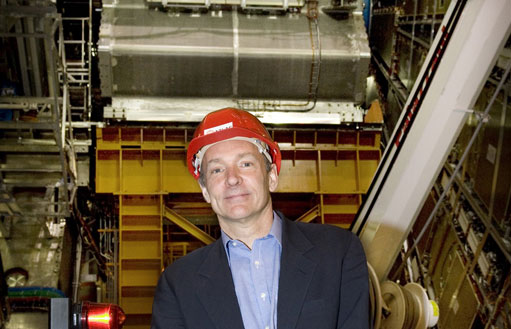
ATLAS e-News
23 February 2011
Web@20
23 March 2009

Tim Berners-Lee in ATLAS
“Vague, but exciting” were the unforgettable words that the late Mike Sendall scrawled across a memo that landed on his desk in March 1989. The document was written by Tim Berners-Lee, and the groundbreaking idea that it laid out – the World Wide Web – changed our world forever.
Twenty years on, a celebration was held in the Globe to commemorate Berners-Lee’s revolutionary idea and the belief and vision of the colleagues who helped him to take it forward.
In his keynote speech, Berners-Lee credited CERN’s “culture of sharing and openness” as perfect for conceiving and fostering radical new ideas. He described the organisation as “a lab that pushes back the boundaries.”
“Physicists are early adopters … they’re always pushing the technology in lots of different directions,” he said, although he recalled that his idea had to be worked on in the sidelines to begin with. Sendall, as his supervisor, “didn’t give me the nod for the World Wide Web, he gave me the wink,” Berners-Lee admitted with a grin.
That was then. Today, there are one hundred billion individual webpages out there. That’s equal to the number of neurones in your brain. Interestingly, Berners-Lee’s original proposal included universal web editing as well as reading, but it was only recently with the Web 2.0 revolution that this part of his vision really began to take flight.
At the celebration, held on March 13th, some of those involved in the initial stages of the Web’s development recounted their memories, and gave a demonstration of the original browser-editor that Berners-Lee developed on a NeXT machine. In an almost poetic meeting of old and new, Berners-Lee snapped a picture of the machine where it all began with a device from today’s cutting-edge – his iPhone.
There were also short presentations from a handful of people whom Berners-Lee believes are pushing the Web forward, with key themes being Linked Open Data and the Mobile Web Initiative.
Linked Open Data (LOD) aims to link information together in a way which reflects how it links together in real life, break down barriers between information sources, and revolutionise the way we work collaboratively.
According to speaker Dan Brickley, co-founder of social network Friend Of A Friend, LOD – as a crucial element of the Semantic Web movement – will instigate a shift from search engines to answer engines; the former returning documents which potentially contain answers to a query, but the latter returning actual defined answers.
The Mobile Web Initiative seeks to make the Web truly mobile by exploiting the fact that there are now more browsers on mobile telephones than on laptops. Speaker Stephane Boyera of the World Wide Web Foundation focussed on how this fact could be used in developing countries to improve the lives of poor people. He cited a current example of Indian fishermen who can query market prices as they bring in their catch, and make informed decisions about the best locations to sell in that day. This has resulted in an eight per cent improvement in income for the fishermen, and a four per cent reduction in costs to the end consumer, due to reduced wastage.

Ceri PerkinsATLAS e-News
|